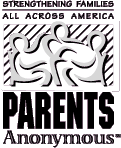|
Program Components The Parent Group Leader Based on the principle of shared leadership, each group must have a parent leader who, in addition to being a group member, also serves as a cofacilitator of the group and promotes leadership among all group members. Other parent leadership activities may be shared so that multiple parents have the opportunity to practice and strengthen their leadership skills, which allows parents to give back to others and increase their self-esteem. The Professionally Trained Facilitator
In addition, the facilitators are mandated to report child abuse and must be comfortable doing so to protect the safety of children in a way that continues to promote the strength of parents. When it is necessary to report child abuse, it is important for facilitators to focus on the parent's role in protecting his or her child, encourage the parent to self-report, and involve the parent with child protective services in any other way possible. This helps ensure that the parent continues to be responsible for the child's safety and well-being, even if it is necessary for the parent to ask for help from child protective services in fulfilling that role. The facilitator is an integral part of the group. He or she serves as a role model, provides links to other community resources, and helps create a sense of safety and positive growth in the group. The nature of the facilitator's role differs significantly from the traditional role of human service professionals, in that it is based on a true partnership with parents and is designed to promote individual parent leadership and strengthen the functioning of the group. Community-Based Volunteer Support Volunteers make up the core support for programs by facilitating groups, operating children's programs, providing childcare, and answering telephone response lines. Moreover, volunteers provide their skill and expertise on boards of directors, fund-raising committees, and public relations campaigns. Their valuable assistance contributes to the cost effectiveness of the program and a high level of community ownership, supports local replication of the model, and ensures that parents and their children have access to Parents AnonymousSM programs. Through volunteering, community members are given a vehicle with which to respond to the needs of their neighbors and to invest in strengthening families and children. Approximately 30,000 volunteers across the country donate an estimated $10 million worth of services annually. Specialized Children's Programs According to an annual database survey given to all Parents AnonymousSM affiliates, specialized Parents AnonymousSM children's programs help approximately 22,000 children and youth gain problem-solving skills, increase their positive social interaction skills, and learn to better understand and manage their emotions. These activities lead to greater self-esteem and more positive interactions with others. Some programs also emphasize building other skills. In Oregon, for example, the programs teach drug and alcohol refusal skills to youth to prepare them to resist peer pressure. Because the children's programs are held in conjunction with the parent groups, the need for childcare is not a barrier to parental attendance. As noted before, sites without specialized programs offer free childcare. Public Awareness and Outreach Parents Anonymous, Inc., and its national network conduct public awareness activities and reach out to potential parent participants through news and feature coverage in local and national media; distribution of brochures, pamphlets, newsletters, and fliers; production and distribution of informational videos; and training programs for professionals in healthcare, social services, education, and other disciplines to encourage their referrals of parents. Parents reach out to other parents through public speaking, newspaper articles, and media interviews; share their successes; and encourage others to join or support Parents AnonymousSM programs across the country. Parents AnonymousSM Helplines Parents Anonymous, Inc., and its national network provide telephone helplines for parents seeking information and referral to local groups. These toll-free telephone services provide a necessary lifeline for parents seeking help. Annually, Parents AnonymousSM provides immediate support and referrals to approximately 90,000 parents through Parents AnonymousSM helplines.
| ||||||||||||||
 Each Parents AnonymousSM group has a professionally trained facilitator who meets with the group each week and is available to the parent leader and other group members between meetings. The facilitator commits to working with the group for a minimum of 1 year and may be a volunteer given release time by his or her employer or paid a stipend. Facilitators bring a variety of skills and talents to their work with Parents AnonymousSM. They are primarily practicing professionals with expertise in social work, counseling, healthcare, mental health, teaching, or related fields. They possess personal characteristics that embody the principles of Parents AnonymousSM. They are knowledgeable about child abuse, juvenile delinquency, group dynamics, family systems, child development, and local community resources. Above all, they must be capable of working with parents in the unique Parents AnonymousSM model of shared leadership and be flexible and accepting.
Each Parents AnonymousSM group has a professionally trained facilitator who meets with the group each week and is available to the parent leader and other group members between meetings. The facilitator commits to working with the group for a minimum of 1 year and may be a volunteer given release time by his or her employer or paid a stipend. Facilitators bring a variety of skills and talents to their work with Parents AnonymousSM. They are primarily practicing professionals with expertise in social work, counseling, healthcare, mental health, teaching, or related fields. They possess personal characteristics that embody the principles of Parents AnonymousSM. They are knowledgeable about child abuse, juvenile delinquency, group dynamics, family systems, child development, and local community resources. Above all, they must be capable of working with parents in the unique Parents AnonymousSM model of shared leadership and be flexible and accepting. 
